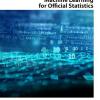Press Releases
Displaying Results 1 - 18 of 18
A UNECE guide, Machine Learning for Official Statistics, released today, will help national and international statistical organizations to harness the power of machine learning (ML) to modernize the production of official statistics.
As found by a 2021 project led by the United Kingdom and UNECE,
The UNECE Steering Group on Population and Housing Censuses, a group of 20 census experts representing 17 countries and international organizations, has released a study, New Frontiers for Censuses Beyond 2020, exploring the new challenges and opportunities for censuses in the region beyond the
Education brings many benefits, among them economic ones: the knowledge and capacities obtained by students and trainees allow them to contribute productively, with the advanced skills needed to fuel our modern economies that rely on specialized services and technologies. The essential role of
As the world tackles the spread of COVID-19 and its unprecedented impacts on economies, societies and the environment, we are all stepping into unknown territory. Everybody, from politicians to parents, from newly unemployed workers to nurses, from supermarket cashiers to schoolchildren in front
The world is facing a crisis like no other. Policymakers are pursuing the combined aims of saving lives and minimizing the adverse economic, social and environmental impacts, and to do so they must take hard decisions and bold moves, quickly and transparently. Such decisions depend on solid data
Two stark trends are becoming ever-more present in today’s world: rapid urbanization, and a growing number and intensity of hazardous events related to climate change. The combination of these two forces makes for an increasing exposure to risk for people, the economy and the environment. The
UNECE has today launched a first Regional report on progress towards the Sustainable Development Goals (SDGs). This comes at a key juncture in the follow-up and review of the 2030 Agenda since its adoption in 2015, and will help to sharpen efforts as we enter the Decade of Action to deliver the
The Sustainable Development Goals’ globally-agreed framework of 232 indicators allows everyone—governments, researchers, civil society, business and beyond—to keep track of how our countries are progressing towards environmental, social and economic sustainability.
A new UNECE Dashboard
The gender pay gap remains a critical issue in all countries of the UNECE region. Although the gap has narrowed in most UNECE countries since 2012, it remains at 16% on average in hourly rates, and 21% in monthly earnings.
Huge differences are seen across the region: the hourly rate pay
Designing policies, tracking progress and holding policymakers accountable for their decisions depends on high quality, reliable and comparable statistical indicators. The essential role of data and statistics for fulfilling the SDGs is marked by their inclusion within the goals themselves: goal
How are we doing?
This question is at the core of many official statistics. When we measure growth in the economy, changing population health, life expectancy or prices, we do so because ultimately we want to know how well our society is doing. Is life getting better or worse? How do we compare
Official statistics are an indispensable element of the information system of democratic societies, serving governments, economies and the public with data that can help them understand and make decisions about the economy, the population, society and the environment. An essential precondition for
International labour migration is an increasingly important feature of the interconnected global economy. It has never been easier for people to travel and work in other countries, especially in common market areas such as the European Union. This expansion of international labour mobility has
‘Evidence-based decision-making’. It’s a term that rolls off the tongue almost without having to think about it, so commonplace has it become in the everyday jargon of policy-making and sustainable development circles.
But it’s something that does bear thinking about. What is a decision
Official statistics provide an indispensable element in the information system of any country, serving the government, the economy and the public with data about the economic, demographic, social and environmental situation. National statistical systems also play a vital role in measuring
Without a census, we cannot know such fundamental things as how many people live in a country, their ages or their income per capita. We cannot meaningfully predict future population and the need for schools, homes or public services. Censuses are essential for many of the indicators that enable
Strong legal backing is a key element for countries to ensure the production of impartial and reliable statistics according to the United Nations Fundamental Principles of Official Statistics. This will be especially relevant when developing statistics in the context of the 2030 Agenda for
UNECE releases its first statistics mobile app, putting in your hands the key indicators you need about the UNECE region in a graphical format. With UNECE Quick Stats you have your main figures on economy, population, forestry or transport at your fingertips wherever and whenever you need them.


